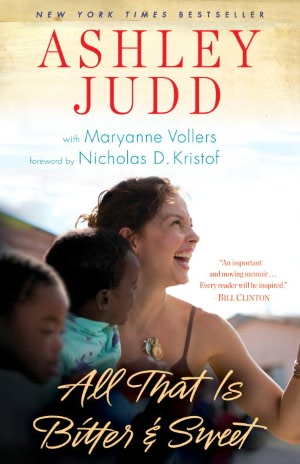Â
If you have wondered, as I have, why Ashley Judd dropped off the radar at a time when she seemed to be at the height of her popularity, you need to read her book, "All That Is Bitter & Sweet."
If you are looking for a cheap, frivolous retelling of her life as a movie star, then skip this one. This is a book devoted equally to her life as an activist for women around the world, and to her childhood and her adult life, which was, to say the least, dysfunctional. In fact she states early on in the book. " She (her mother) and sister have been quoted as saying that our family put the 'fun' in dysfunctional. I wondered: Who was having all the fun? What was I missing?"Â
Finding little satisfaction in her career and suffering from deep depression, she walked away to devote most of the next ten years of her life to advocating for women's rights through the non-profit private global health organization, Population Services International.Â
For all those who oppose our funding for Planned Parenthood in underdeveloped countries, I challenge you to read this book.
She traveled the world as its ambassador, visiting brothels where women and children were often sex slaves infected with HIV, holding babies in Africa afflicted with AIDS from their parents, sleeping in huts on the ground, visiting with truckers in India, most of whom regularly slept with prostitutes as well as children, carrying STD's and AIDS back to their wives, and nearly completely finishing the process of destroying herself along the way.
As she admits when she became recurrently physically ill with stomach cramps, vomiting and diarrhea while in Southeast Asia, "I had left myself too open to the suffering of others."
Workers who had been at this longer than she sat her down and reminded her that she could not take on the pain of everyone she met--the HIV positive prostitutes, the ten-year-olds sold into prostitution by their families to buy food, the orphans, the sick mothers in their huts, the farm girl tricked into prostitution by a friend when she thought she was coming to the city to work in a garment factory.
Â
"You can carry the message," one worker told her, "but you are not the message. Quit taking on people's stuff.  Pray for the spiritual wisdom to have discernment between empathy and enmeshment. There is a God, and you're not it."
The fact that Ashley Judd even survived her childhood is amazing in itself. The product of a broken home, she was shuffled between her two parents, both of whom left her home alone for a week or longer when she was just a child. She was also at times dumped at an aunt or uncle's house while her mother and older sister followed their dream. Each summer she was sent to her grandparents, apparently the only stability she really ever had.
She speaks of Naomi and Wynona going to hear Merle Haggard sing when she was still a small child. They wrangled a pass backstage, sang for him, and he took them with him for a week on the road.
No one contacted her; she was just home alone at age ten for the next week. Her mother would often disappear with this boyfriend or that one for a week or two as well. Sometimes, Wynona, four years older, was there; sometimes, she escaped to a friend's home. By the time she was seven, she was escaping into a fantasy world and deeply depressed. Her mother kept a gun in her home, which Ashley would for years get out, put it to her head, and wonder what it would be like to pull the trigger and end the pain. Miraculously, she never did. It was not until she was thirty-seven-years old that she finally entered rehabilitation to begin recovering from one of the saddest childhoods of which I have ever read --one that included abandonment, sexual abuse, addiction, incest, and a narcissistic mother. She identifies herself as "the lost child" in her family dynamic.  It is truly a miracle that this "lost child" did not become an addict herself or commit suicide. Instead, somehow, she persevered in spite of attending over thirteen different schools. to go on to graduate with honors from the University of Kentucky with a major in French and four minors. During her break from acting she also went back to Harvard to earn a master's degree. If you are looking for fluff about celebrities, skip this book. However, if you can look at pain and heartbreak, both on the world stage and close up in someone's life, it is worth your time. Â
When her mother was home, she had this man or that living with them. One particular boyfriend, for whom Naomi fell hard and eventually married, often cheated on her at the beginning. Naomi, consumed with jealousy, would pull out her gun, threatening to kill him. On at least two occasions, Ashley's sister called the police.



